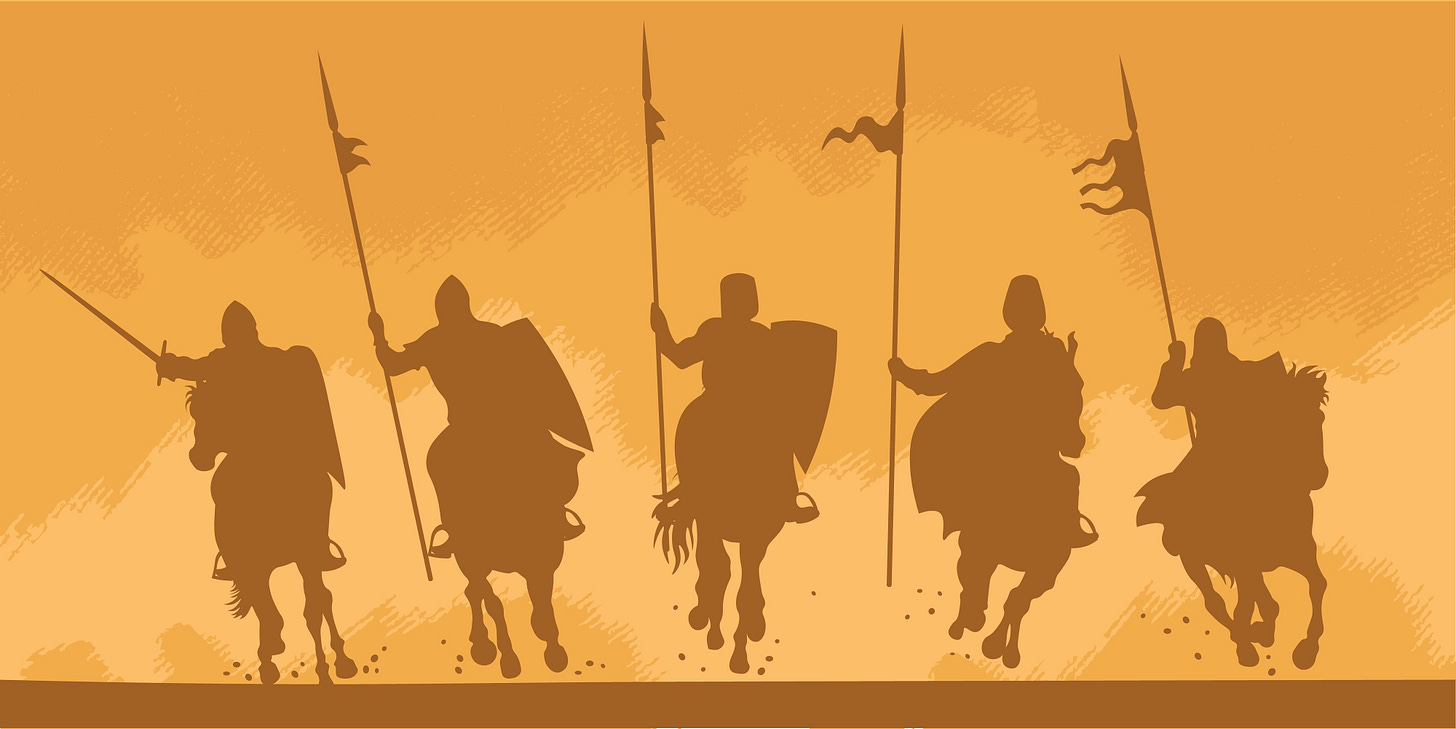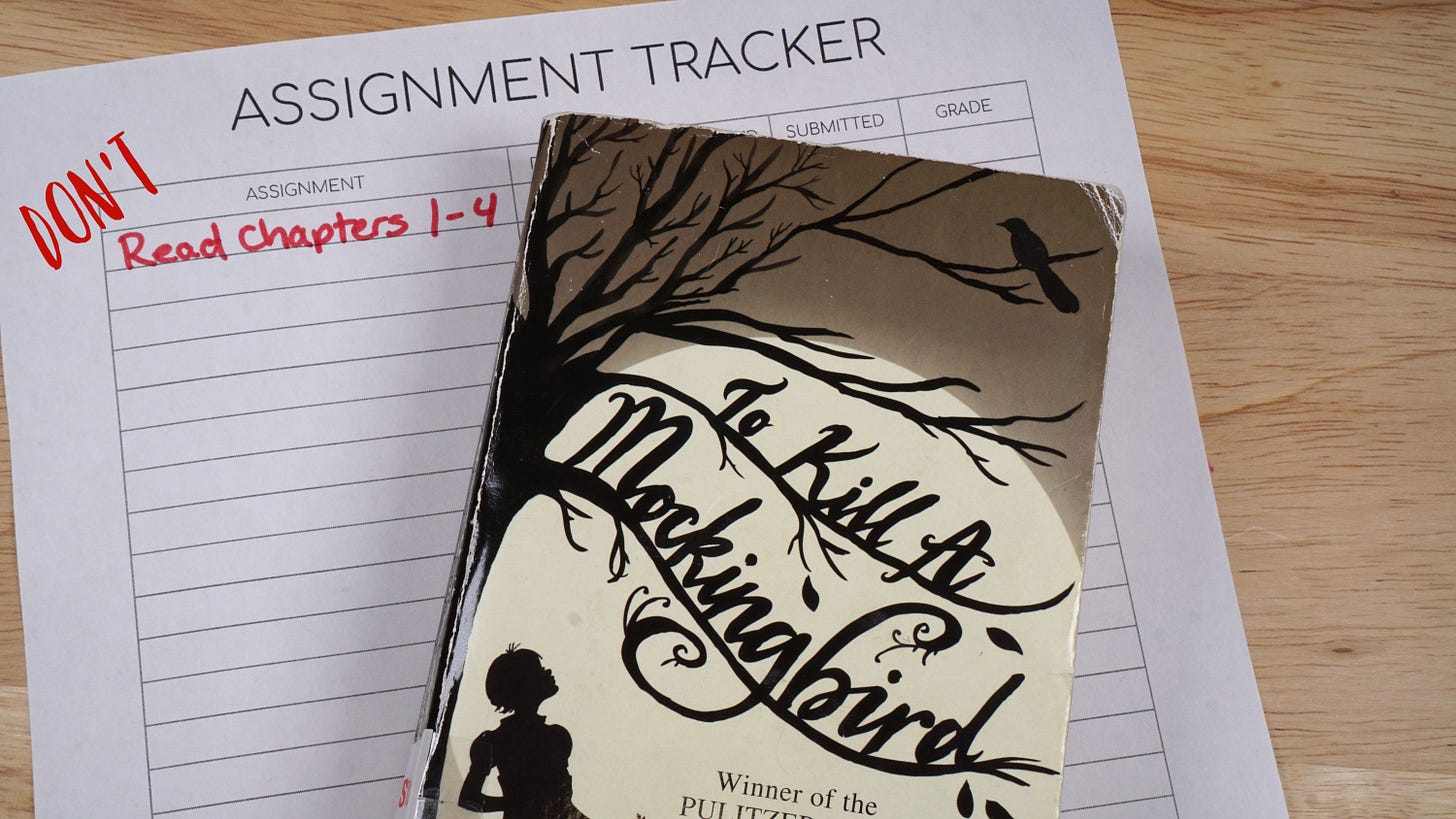E-Pluribus | November 15, 2023
Faux-moral distinctions, all the way down; a time to kill (a classic book); and a teacher who asked too many questions.
A round-up of the latest and best musings on the rise of illiberalism in the public discourse:
Joshua Mitchell: The Anti-Liberal Crusade
There’s nothing new under the sun, the author of Ecclesiastes wrote. Joshua Mitchell at City Journal says that’s certainly true when it comes to the efforts of anti-liberals. Echoing biblical themes, Mitchell outlines the never-ending search for some kind of redemption that characterizes these various movements.
Support for Hamas on U.S. college campuses has not surprised those of us who have witnessed the slow but decisive erosion of liberal thought on the hallowed grounds ostensibly committed to nourishing it. The humanities capitulated decades ago; now the natural and social sciences have succumbed as well. Every discipline stumbles over itself seeking absolution for sins its present-day adherents did not commit. College administrators respond to, and accelerate, this longing, while students bear the ever-rising cost of an anti-liberal crusade. In gatherings formal and informal, faculty, staff, and students signal their religious need to be counted among the redeemed rather than the damned.
All of this was foreseeable. Every anti-liberal revolutionary movement since the French Revolution has offered followers its own version of redemption. None has satisfied the deepest human longings of the human heart. Each has exhibited unconscionable moral blindness.
[. . .]
Identity politics, the genus within which currently prominent Whac-A-Mole developments like CRT, DEI, cancel culture, and transgender “affirmative care” are species, is the latest comprehensive revolutionary movement, third in line after the French Revolution and Marxism. It is the framework within which the faux-moral distinctions identified above currently find a home. Identity politics can become as globally destructive as Marxism has been—unless it is stopped in its tracks. Identity politics supposes that you are not a person but rather a marker and instance of a group, whose “identity” does not merely distinguish you from other groups but also locates you in an intersectional hierarchy of cleanliness or filth, in which the white, heterosexual male is the most leprous of all. In short, identity politics does not merely distinguish groups; it ranks them with respect to their innocence. The rule of law, so necessary for a liberal, multiethnic society to flourish, does not apply to those whom identity politics deems innocent victims, who are innocent in a way that the law cannot grasp. Antifa members who destroyed property worth billions of dollars during the 2020 summer of riots may have been guilty according to the law, but that did not matter, because by the higher standard of innocence set forth by identity politics, they were innocent victims.
Identity politics evaluates individuals on the basis of the transgressions or innocence of their forefathers. Are you a member of an innocent victim group, or a transgressor group? That is what our students are being asked on college campuses today. If you are among the second group, you may seek purification from the DEI juggernaut in HR and so-called student services, and then you will receive your diploma, which confirms not your competence but rather your moral purity.
Read it all here.
Cathy Young: To Kill ‘To Kill a Mockingbird’
“Book banning” is one of the most misused phrases in political discourse. The singer Pink nicely demonstrated the point when she announced she’d be handing out… banned books at her Florida concerts. Some “ban.” At The Bulwark, Cathy Young points out that if the left wishes to condemn “book banning,” a good look in the mirror is in order, as the To Kill a Mockingbird saga in a Washington State school district illustrates.
After all the controversies about right-wing activists working to purge public school curricula and libraries of books they find objectionable—generally ones dealing with either sexual morality or the painful history of racism in America—the latest report of such a purge comes from a liberal blue-state community. This time, Harper Lee’s To Kill a Mockingbird, a beloved antiracist classic, has been taken off the list of required books in high school freshman English classes in the Mukilteo School District in Washington State due to a complaint from four progressive teachers who regard it as racially insensitive and harmful to minority students.
[. . .]
The complaint from the teachers in the Mukilteo School District, three of whom are white and one black, is that To Kill a Mockingbird “centers whiteness,” omits black voices, and enshrines “white savior” tropes. It may ostensibly denounce racial injustice—a black man, Tom Robinson, is convicted of a rape that everyone knows he didn’t commit and then shot dead when he attempts a desperate prison break—but the narrator and nearly all the other major characters are white, and much of the focus is on the heroic white lawyer, Atticus Finch, who defends Tom.
[. . .]
[Their] critiques rely on a highly tendentious reading of the novel. For instance, “being very polite” is an odd way to describe a man keeping watch in the county jail at night to protect his black client from a lynch mob—or risking pariah status in the town by openly confronting a white woman about her false accusation of rape against a black man. What’s more, the charge of “white saviorism” misses the fact that Atticus doesn’t save Tom, precisely because, in a profoundly racist system, a black man accused of raping a white woman cannot be saved.
[. . .]
. . .To Kill a Mockingbird ultimately offers a hopeful message: change in hearts and minds will make change in society possible. This message may partly reflect the book’s history: Lee’s biographer Charles J. Shields and the historian Joseph Crespino have suggested that the evolution of Atticus from Watchman to Mockingbird was due to the evolution of Lee’s father, a lawyer, civic leader, and newspaper editor on whom the character was based. Go Set a Watchman was inspired in part by Lee’s anger at her adored father’s segregationist views; but it appears that while she was rewriting her novel, he was revising his views in a pro-civil rights direction.
To Kill a Mockingbird is an intensely antiracist book; but its antiracism is rooted in liberal humanism and empathy (“You never really understand a person until you consider things from his point of view . . . until you climb into his skin and walk around in it,” Atticus tells his children in what is perhaps the novel’s most celebrated passage). It stands in contrast to the current progressive ideology that fixates on identity and on hierarchies of oppression and privilege.
Read the whole thing.
William Reusch: How A Teacher Became An Outcast
Education is all about asking questions and searching for answers. However, William Reusch, writing at his Substack The Black Sheep, explains how his inquisitiveness into DEI got him in trouble with his fellow teachers and the educational establishment.
When the video of George Floyd’s death went viral and the Summer of BLM began, I noticed a change in “Teachergram,” our nickname for the social media world of education industry influencers I had begun to cultivate an audience in. Profile pictures turned to black boxes and terms like “whiteness” and “systemic racism” and names like Robin DiAngelo and Ibram X. Kendi became ubiquitous.
I’d been reading writers like John McWhorter, Coleman Hughes, and Thomas Chatterton Williams for years, so this topic wasn’t new to me. What was new was the extent to which my entire community had become ensnared in the very views those writers had so thoroughly debunked. My curiosity got the better of me as I sought to understand how everyone around me could be diving headfirst into it all.
I would often DM other notable members of Teachergram with questions about their posts repeating platitudes such as “elevate black voices” or instructing educators to read books like White Fragility, but I didn’t get far. Challenging their views would usually be met with silence or by being blocked.
At school, however, my questions couldn’t be so easily ignored. When Diversity, Equity, and Inclusion (DEI) training was rolled out, my hand was continuously raised during the sessions. Eyes rolled alongside expressions of disappointment and disgust from my colleagues, who viewed me as ignorant at best and immoral at worst. “Problematic” was a word I began to hear on a regular basis. The National Education Association and the Council of Chief State School Officers blacklisted me from engaging with their representatives.
[. . .]
I know with certainty that I would have been fired had I been at any other school in LA—public or private. Luckily, I found myself in a unique teaching situation at a Modern-Orthodox Jewish School. Even though we did hold DEI trainings and my colleagues in the humanities department tended to be on the far-left politically, the culture of this community was one that embraced dialogue and challenging discussions.
[. . .]
The American school system is, sadly, deeply broken. From its origins, the Prussian model of education that we still use today was built to instill obedience within its students. Rather than prepare them to be curious critical thinkers, we still train our students for compliance as if they were going to be factory workers. A “good student” is one who does what they’re told.
Rather than this issue improving as it needs to for our new era of the knowledge economy, the problem has become even worse.
Read it all.
Around Twitter (X)
Presidential candidate Nikki Haley cracked open a giant can of worms regarding the right to anonymity (or lack thereof) in an interview with Fox News on Tuesday:
Matt Welch of Reason takes issue with the “threat” Haley claims we are facing:
Kmele simply responds by posting a rather famous example of political commentary written by… “an Englishman”:
To sum things up, here’s Jeff Kosseff, associate professor of Cyber Law at the U.S. Naval Academy:
And finally, they say a picture is worth a thousand words (hat tip: Colin Wright). So if you’re wondering what "enhance capacity to embed intersectional gender equity into women's professional sport" means, here you go:











